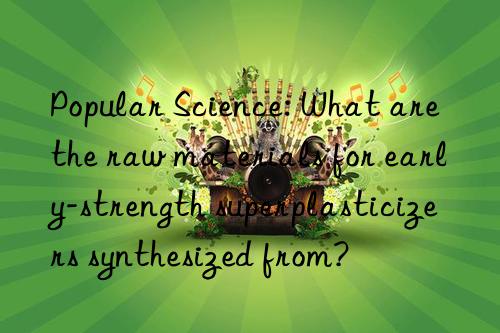
What are the raw materials for early-strength superplasticizers made of? Both the industry and grassroots workers are very curious. The editor of Qingdao Dingchang New Materials Co., Ltd. was talking with a man who has been engaged in the concrete industry for dozens of years. Years of workers have learned that:
Synthetic raw materials of early-strength superplasticizer:
(1) Unsaturated acids: maleic acid, maleic anhydride and acrylic acid, Methacrylic acid, etc.;
(2) Polyalkenyl macromonomers: polyalkenyl hydrocarbons, ethers, alcohols, etc.;
(3) Polystyrene sulfonate Or ester;
(4) (meth)acrylate, ester, benzene, acrylamide, etc.
Raw materials used in the synthesis of early-strength superplasticizer
Allyl alcohol polyoxyethylene ether (APEG), chemical structural formula: CH2=CHCH20 (CH2CH20)n H):
Ammonium persulfate (AI'S), molecular formula (NI-I4) 2S208, molecular weight 228.2, properties: white crystal, with certain oxidizing properties.
Potassium persulfate, molecular formula K2S208, molecular weight 270.32, inorganic compound, white crystal, odorless, deliquescent, combustion-supporting, and irritating.
Maleic anhydride ( ), molecular formula CHCOOCOCH;
Molecular weight 98.06, colorless needle-like crystals.
Sodium allyl sulfonate (SAS), molecular weight 144.1; structural formula: CH2=CH—CH2—SO3Na; white solid powder.
Sodium Methacrylate Sulfonate (SMAS), an industrial product, molecular structure formula: CH2C(CH3)CH2SO3Na, molecular weight 158.15, white flaky crystals.
Methacrylic acid (MAA), analytically pure, colorless liquid, molecular formula: C4H60, molecular weight 86.09, freezing point ≥12.5"C.
Acrylic acid (from), molecular formula: C3H402, Molecular weight 72.06, content ≥99.0%, colorless liquid, pungent odor
Synthesis method of early-strength water-reducing agent: acrylic acid, sodium methacrylate sulfonate, ammonium persulfate, polyoxyethylene ethylene The propyl ester macromonomer was prepared into an aqueous solution with a concentration of 20% using deionized water. In a three-neck flask equipped with a stirrer, reflux condenser and thermometer, the monomer and initiator were added dropwise in batches. After the addition was completed, Incubate the reaction at 75°C for a certain period of time. After the reaction, adjust the pH value to 7-8 with a NaOH aqueous solution with a concentration of 20% to obtain a yellow or reddish-brown early-strength superplasticizer with a concentration of approximately 20%.
The main varieties of high-efficiency water-reducing agents in China include: naphthalene sulfonate formaldehyde condensate (naphthalene series), sulfonated melamine formaldehyde condensate (melamine series), sulfamate series, aliphatic series and early-strength superplasticizer, etc. .
Early-strength water-reducing agent is the high-tech water-reducing agent with the largest production volume and the most widely used in China (accounting for more than 70% of the water-reducing agent consumption). Its characteristics are:
a. High water reduction rate (15% ~ 25%), b. No air entrainment, c. Little impact on setting time, d. Relatively good adaptability to cement and can be used in combination with various other admixtures, e. Relatively cheap
Compared with other types of water-reducing agents, early-strength water-reducing agents not only have super-dispersing properties, but also can suppress the slump loss of concrete. They are currently the most popular water-reducing agent developed at home and abroad. The focus of research. Early-strength water-reducing agent has relatively good adaptability to different cements. It is easier to exert its low viscosity and slump maintenance properties at low water-cement ratios, so it is widely used in Europe and Japan. Quick.</p



 微信扫一扫打赏
微信扫一扫打赏
